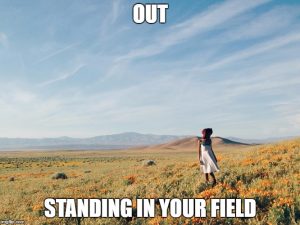We just finished reading through 240+ stories for our new anthology. Other people have echoed similar sentiments, but reading slush really highlights things I’ve done as a writer that I probably want to rethink. I thought I might share some of the things I’ve seen over five years of slush.
This post got longer than intended so I’m breaking this up into two three posts. You’re welcome. (Click here for Part Two. Click here for Part Three.)
I’ll try to focus more on things I could do better. When using examples from things we’ve edited, I’ll also try to highlight things from Mad Scientist Journal rather than anything recent.
Before I dig in, here are some disclaimers:
- I dislike the idea of “conventional wisdom.” In part because of survivorship bias. In part because there are constant exceptions to any rule that gets laid down.
- One of the many pearls of wisdom I learned from James Gunn’s writer’s workshop is: never give an editor an excuse to say, “No.” There’s value in knowing why an editor will say no.
- I say “editors” because it’s what I am and what I know. This could apply to agents, publishers, or other literary gatekeepers you want to impress. But I’m just going to say editors because I’m lazy.
- The advice here is about controlling what you can actually control. The universe is fickle and there are variables that you have no way to know about or plan for. So focus on what you can actually do.
Don’t Blend In

Sometimes people think this means you need to do something zany with their submission. (“I’m going to submit this with red text in comic sans!”) So first off: don’t. It doesn’t look like they’ve hit upon a new way to stand out. They just look like they either didn’t bother to read the submission guidelines.
Don’t be the person who doesn’t bother to read and follow the submission guidelines. It just looks unprofessional. Don’t give them an excuse to dislike your story before they’ve read a single word.
With that mini rant out of the way, let’s talk about the actual writing.
After years of reading slush, we have seen the same stories over and over again. Let me tell you: it’s mortifying to see something I thought was clever written by fifty other people.
Themed anthologies intensify this trend. There are obvious stories associated with a theme. If you run a mad-scientist-themed magazine, you get a lot of people submitting rambling monologues from misunderstood geniuses. These get old fast.
I often hear that there are only so many stories, and they’ve all been told. The common advice, then, is that each author brings their own unique take to any individual story. You can probably find a poster or meme with a quote from Neil Gaiman about that. Probably on Etsy.
From a high concept philosophical point of view, it sounds great. As a younger writer, I would have found it truly inspirational. It wouldn’t have helped me much, but it could have buoyed me up with some short-lived over-confidence.
With some experience, the suggestion to “write the stories only you can write” is as useful to me as “just start running marathons.”

I only run when chased.
It’s arguably a great idea, but provides no sense of how you get there. After over a decade of trying to write professionally, and over a decade of less professional writing, I am only starting to understand what the hell the “story only I can write” even means. And, for that matter, is that all I want? A me-shaped box?
Coming at this as an editor, I can say it’s hard to see those nuances in manuscripts. Does this mad scientist monologue stand out from the dozens of other mad scientist monologues? Not really.
I have no great ideas for how to fix that. But here are some maybe okay suggestions.
First, try a bunch of shit and fail a lot.
It’s easy to psych yourself out and second guess every choice, but that way lies paralysis. You will focus on lists of things to avoid, and beat your head uselessly against the fear that you’ll be just the same as everyone else. I have a lot of first paragraphs I’ve deleted and re-written just because I “knew” I was doing it wrong.
So just go for it and see what happens. I would not be close to having any sense of my writing strengths if I didn’t learn what I’m bad at the hard way. Repeatedly. With tears and prescription medication.
No matter what else I might say, no matter how many rules you know about, don’t be afraid to screw up spectacularly. Even if they are the same mistakes that thousands of other writers make.
Second, reconsider writing the first story that comes to mind.
Some people will suggest that you should trust your instincts. Or your muse. Or whatever. If you feel inspiration, you should go with that feeling.
Me? My brain hates me and can’t be trusted. It’s a constant stew of anxiety, depression, and knee jerk reactions. Decades of immersion in media means my brain is conditioned to react to basic stimulus with pop culture things lodged forever in there. “Mad scientists?” my brain will say. “I know just the thing! A rambling monologue!”

I also get “One Week” by Barenaked Ladies stuck in my head all the time. Words like “one week,” “two weeks,” “Aquaman,” “vanilla,” “waiver,” and “funeral” will get me instantly thinking of a line from that song.
It’s great to steal from the best. I often want to take my own stab at stories that I’ve loved. Whether it’s Raymond Chandler, Roger Zelazny, or Neil Gaiman. And it can be useful to emulate others while you seek to find yourself. Sometimes that’s worked out for me, sometimes it just came off as derivative.
But I’ve also had success trying to think about where else I can take that obvious story. I’m certainly more proud of my weird stories that worked.
The second story I ever submitted to a magazine was for the romance issue of Crossed Genres. My first thought was some vampire/human romance. Because that’s what surrounded me. This was also the same year the first Twilight movie came out, so even I was able to see that the market was glutted with vampire romance. So I thought, “What is the least likely romance option they are going to see?” My answer? “Extra-dimensional Lovecraftian horror.”
It was a gamble. Even overconfident younger-me wasn’t sure he could pull it off. I almost chickened out and didn’t submit it. I was pretty sure they’d hate it, and probably me, either way.
But they bought it. When they did a year’s-best collection, mine was the story they picked from that issue.
This isn’t a golden bullet. As both an author and an editor, I know this can go horribly wrong. Most often, it’s because I’m either not as clever as I thought or my skill wasn’t where it needed to be in order to pull it off my zany idea.
But I don’t think I could have told a genre-crossing romance story with a vampire that would have been noteworthy among all the other vampire stories. Or werewolf stories. Or fairy stories. It was only by going off the map that I really stood a chance.
Third, do some research.
Some nerdy elders will tell you that you need to understand the classics or read the archives of a magazine so that you never tell a story that someone else has already done. And that may work. I never do it, but it kinda makes sense.
A faster and easier option is to just look at submission guidelines.
A lot of magazines will tell you what they don’t want. You can find examples at Clarkesworld and Beneath Ceaseless Skies. Strange Horizons has a lot of great resources, including a (no longer updated) list of stories that they’ve seen too often.
Another oft-cited resource is the Turkey City Lexicon. It covers a things that people in SF workshops have seen frequently enough that they gave a name to them.
Fourth, try a bunch of shit and fail a lot.
At this point, you might feel overwhelmed by all the ways you could inadvertently write something derivative and unoriginal. That’s one of many fears running through my head when I’m writing. (Or thinking about writing. Or lying awake at night and worrying about everything.) So I understand.
All you can do is try, screw up, learn lessons, and write the next thing. Getting people to buy your writing is hard and discouraging, but all you can do is get back on the horse and plug away at the metaphor.
None of these are rules that You Must Obey. They’re things that I have noticed and have heard other editors comment on. So don’t feel you must know and follow every rule that someone tells you.
Except for submission guidelines. Seriously, read them and follow them.
I’ll be back later with part two, where I have more things to make you anxious.
Continue on to Part Two. Or skip ahead to Part Three.



